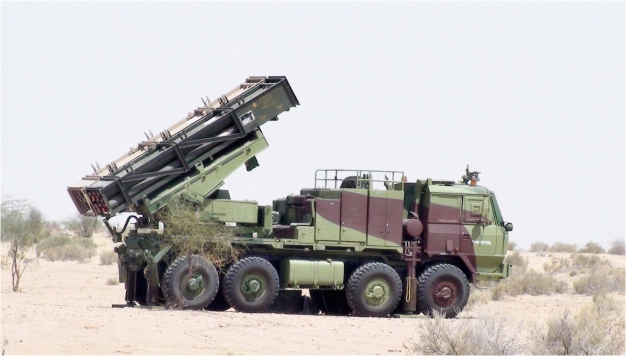SOURCE: RAUNAK KUNDE / NEWS BEAT / IDRW.ORG


Satyanarayan Nuwal, Chairman of Solar Defence and Aerospace Limited, a subsidiary of Solar Industries, has revealed that Spain is the latest country engaged in discussions for the potential supply of India’s indigenous Pinaka Multi-Role Rocket Launchers (MRBLs).
This development follows the successful export of Pinaka systems to Armenia and ongoing negotiations with France, signaling a growing international appetite for India’s advanced artillery technology. Nuwal’s announcement, made in early 2025, underscores Solar Defence’s pivotal role in positioning the Pinaka as a competitive alternative in the global defense market, even as Spain advances its own rocket launcher program with the Israeli Elbit Systems’ PULS-based Silam.
Now, Spain has entered the fray. Nuwal confirmed that talks with Spanish authorities are underway, positioning the Pinaka as a potential complement or alternative to Spain’s ongoing Silam rocket launcher program. “After Armenia and France, Spain is one of the countries with whom we are holding discussions for the Pinaka MRBLs,” Nuwal stated, highlighting Solar Defence’s aggressive push into European markets. This move reflects India’s ambition to expand its defense exports, which already span over 100 countries, with the Pinaka emerging as a standout offering.
Spain’s interest in the Pinaka comes amid its commitment to the Silam rocket launcher, a localized adaptation of Elbit Systems’ Precise and Universal Launching System (PULS). In December 2023, the Spanish Military Procurement Directorate awarded a €700 million contract to a consortium of Spanish companies—Escribano Mechanical & Engineering and Rheinmetall Expal Munitions—to develop and supply the Silam system. The contract includes twelve launchers, support vehicles, and a phased delivery schedule: training rockets and launchers by the end of 2024, live ammunition starting in 2025, and full delivery by 2028. The package also encompasses ten command post vehicles, two recovery vehicles, six high-mobility reconnaissance vehicles, twelve munition vehicles with cranes, and a testing platform.
The Silam, based on the PULS, offers a modular design with rockets like the Accular 160mm (10 rockets, 40km range) and the EXTRA (4 rockets, 150km range), providing flexibility for short- and medium-range strikes. However, Spain appears to be exploring the Pinaka to address potential gaps in its artillery capabilities. The Pinaka Mk-1, with a 38km range, and the guided Pinaka Mk-2, exceeding 75km—with variants under development targeting 120km, 150km, and 200km—offer a broader spectrum of engagement ?surprising range options that could complement the Silam’s capabilities. This versatility, combined with its rapid salvo rate (12 rockets in 44 seconds), makes the Pinaka an attractive option for Spain as it seeks to enhance its artillery firepower.
Spain’s interest in the Pinaka suggests a dual-track strategy: advancing the Silam program while exploring cost-effective, proven alternatives like the Pinaka to bridge range and capacity gaps. The Pinaka’s lower lifecycle costs and indigenous production could appeal to Spain’s defense planners, especially as European nations face budget constraints and rising security threats. For Solar Defence, securing a deal with Spain would mark a significant coup, challenging the dominance of systems like the PULS and HIMARS in NATO markets and reinforcing India’s growing clout in global defense exports.
NOTE: Article cannot be reproduced without written permission of idrw.org in any form even for YouTube Videos to avoid Copy right strikes. Websites doing illegal reproductions will get DMCA and Legal Notices.